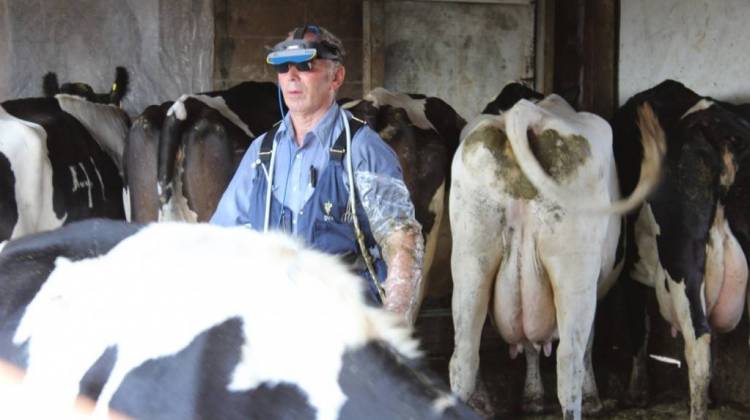
Farm veterinarian Tom Troxel performs ultrasounds on a herd of dairy cows in Pulaski County.
Annie Ropeik/IPBCongress is once again considering a bill to help pay off more student debt for veterinarians in high-need, rural areas.
The proposal has stalled in committee for the past several years – but advocates for Hoosier vets say it’s needed now more than ever.
Indiana’s two USDA-designated veterinarian shortage areas cover most of the west central part of the state – two districts made up of 17 counties, centered around the cities of Lafayette and Brazil.
The area only has 26 vets altogether, covering more square miles and animals apiece than in any other part of the state. The region is home to everything from huge pig farms to small backyard flocks.
Indiana state veterinarian Bret Marsh says the dearth of vets in a place like this is a problem. Under new federal regulations, vets have to write more prescriptions and do more farm visits than ever before – as farms get bigger, fewer and farther between.
The shortages are also a public health risk, he says.
“There are foreign animal diseases around the globe that we don’t want in the United States,” Marsh says. “If they should be introduced in areas where we simply missed it because we didn’t have veterinary coverage, that would be a great loss.”
But vets carry a lot of student debt – at least $150,000 on average, says Marsh – and many can’t afford to start working in a rural place.
So the USDA will help with payments for vets who set up shop in shortage areas. Since 2010, they’ve picked several vets a year across the country to receive $75,000 in loan forgiveness over three years.
But there’s a problem, says Bret Marsh. The IRS takes 39 percent of the program’s funds in taxes.
“So if we can remove that tax, as has been done for the physicians, several years ago, then there’s more money to award to veterinarians in these under-served areas,” Marsh says.
He says the program isn’t likely to get more funding soon – so they want to make the most of what they already have.
The tax exemption plan is currently in the Finance and Ways and Means committees in the U.S. Senate and House of Representatives.
 DONATE
DONATE








 Support WFYI. We can't do it without you.
Support WFYI. We can't do it without you.